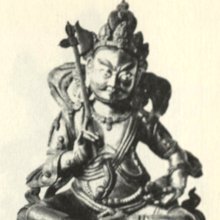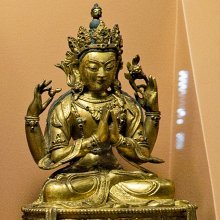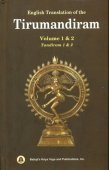Hu, Hū: 13 definitions
Introduction:
Hu means something in Hinduism, Sanskrit, Jainism, Prakrit, Tamil. If you want to know the exact meaning, history, etymology or English translation of this term then check out the descriptions on this page. Add your comment or reference to a book if you want to contribute to this summary article.
Images (photo gallery)
(+7 more images available)
In Hinduism
Vyakarana (Sanskrit grammar)
Source: Wikisource: A dictionary of Sanskrit grammarHū (हू).—The last of the spirant consonants, which is a glottal, voiced letter called also ऊष्म (ūṣma) or spirant of a partial contact, i. e. possessed of the properties कण्ठय, नादानुप्रदान, ऊष्म (kaṇṭhaya, nādānupradāna, ūṣma) and ईषत्स्पृष्टत्व (īṣatspṛṣṭatva). This letter has been given twice in the Paninian alphabet, viz. the Mahesvara Sutras, and the Bhasyakara has given the purpose of it, viz. the technical utility of being included among soft consonants along with semi-vowels, nasals and the fifth, the fourth, and the third class-consonants (हश् अश् (haś aś) etc.),as also among the hard consonants along with the fourth and the third class-letters and spirants (झल् (jhal),). The second letter हू (hū) in हल् (hal) appears, however, to have only a technical utility,as the purpose of its place there among spirants is served by the Jihvamuliya and the Upadhmaniya letters which are,in fact, the velar and the labial spirants respectively, besides the other three शू, षू (śū, ṣū) and सू (sū) .The Rk Pratisakhya calls ह (ha) as a chest sound. For details, see Mahabhasya on the Siva Sutra हयवरट् (hayavaraṭ) Varttikas 1, 2 and 3.

Vyakarana (व्याकरण, vyākaraṇa) refers to Sanskrit grammar and represents one of the six additional sciences (vedanga) to be studied along with the Vedas. Vyakarana concerns itself with the rules of Sanskrit grammar and linguistic analysis in order to establish the correct context of words and sentences.
Languages of India and abroad
Sanskrit dictionary
Source: DDSA: The practical Sanskrit-English dictionaryHu (हु).—3 P. (juhoti, hutaḥ; pass. hūyate; caus. hāvayatite; desid. juhūṣati)
1) To offer or present (as oblation to fire); make an offering to or in honour of a deity (with acc.); sacrifice; यो मन्त्रपूतां तनुमप्यहौषीत् (yo mantrapūtāṃ tanumapyahauṣīt) R.13.45; जटाधरः सन् जुहूधीह पावकम् (jaṭādharaḥ san juhūdhīha pāvakam) Kirātārjunīya 1.44; हविर्जुहुधि पावकम् (havirjuhudhi pāvakam) Bk. 2.11; Manusmṛti 3.87; Y.1.99.
2) To perform a sacrifice.
3) To eat.
--- OR ---
Hū (हू).—ind.
1) An interjection of calling.
2) Of contempt.
3) Of pride.
4) Of grief (oh! ah! alas &c.).
--- OR ---
Hū (हू).—&c. See हुम् (hum); (a particle expressing anger); ... डूं मातर्, दैवतानि धिक् (ḍūṃ mātar, daivatāni dhik) Bhaṭṭikāvya 6.11.
Derivable forms: hūm (हूम्).
Source: Cologne Digital Sanskrit Dictionaries: Edgerton Buddhist Hybrid Sanskrit DictionaryHu (हु).—and hū, m.c. (= AMg. id.), rarely for khu (q.v.) = Sanskrit khalu, of course, etc.: ma hū Lalitavistara 141.3 (verse); mā hu 202.6 (verse). Prob. not contained in Rāṣṭrapālaparipṛcchā 58.18 (verse) jāhu, q.v.
--- OR ---
Hū (हू).—see hu.
Source: Cologne Digital Sanskrit Dictionaries: Shabda-Sagara Sanskrit-English DictionaryHu (हु).—r. 3rd cl. (juhoti) 1. To sacrifice, to offer in oblation, (sometimes with the accusative of the deity honoured.) 2. To eat. 3. To take. 4. To please or satisfy. 5. To throw or cast.
--- OR ---
Hū (हू).—Ind. An interjection of calling, of contempt, of pride, and of grief or weeping.
Source: Cologne Digital Sanskrit Dictionaries: Benfey Sanskrit-English DictionaryHu (हु).—ii. 3, juhu, [Parasmaipada.] 1. To sacrifice, [Mānavadharmaśāstra] 4, 206. 2. To worship by oblations, [Mānavadharmaśāstra] 2, 156. huta, 1. Sacrificed, [Bhartṛhari, (ed. Bohlen.)] 2, 67. 2. One to whom is sacrificed, [Sāvitryupākhyāna] 1, 21. n. Oblation. Comp. A-huta, adj. not sacrificed (= japa), divine study, [Mānavadharmaśāstra] 3, 74. Ptcple. of the fut. pass. havya, Fit to be offered. n. 1. An offering to the gods, [Mānavadharmaśāstra] 1, 94; 95. 2. Clarified butter, [Kirātārjunīya] 1, 22. [Causal.] To cause to worship, [Rāmāyaṇa] 2, 25, 25.
— With ā ā, āhuta, Worshipped by sacrifices, [Lassen, Anthologia Sanskritica.] 100, 14 = [Rigveda.] vii. 15, 7. āhavanīya, m. (viz. agni), The sacrificial fire, [Mānavadharmaśāstra] 2, 231.
— With abhyud abhi -ud, To worship by sacrifices, [Raghuvaṃśa, (ed. Stenzler.)] 1, 53.
— With pra pra, prahuta, m. (viz. yajña), Sacrificial food offered to spirits, [Mānavadharmaśāstra] 3, 73. n. Offering to spirits. Comp. A-prahuta, adj. not sacrificed before, [Bhāgavata-Purāṇa, (ed. Burnouf.)] 5, 26, 18.
— Cf. [Gothic.] giutan; A. S. geotan; [Latin] fundere.
--- OR ---
Hū (हू).—an interjection of calling, of contempt, of pride, and of weeping.
Source: Cologne Digital Sanskrit Dictionaries: Cappeller Sanskrit-English DictionaryHu (हु).—juhoti juhute [participle] huta (q.v.) pour into the fire, cast into the fire, offer, sacrifice. [Causative] hāvayati cause to sacrifice or be sacrificed. [Desiderative] juhvaṣati wish to sacrifice. [Intensive] johavīti sacrifice repeatedly.
--- OR ---
Hū (हू).—(hvā), hvayati, hvayate, havate, huvate, huvati etc., [participle] hūta call (avase or ūtaye for help), call upon, invoke, summon, invite, challenge (yuddhe to fight). [Causative] hvāyayati & [Desiderative] juhūṣati (only —°). [Intensive] johavīti etc. call, invoke.
— ati call over. anu call again or back. abhi call near. ava call down or hither. ā call to or hither, invite, summon ([rarely] & [jurisprudence]); utter, recite; [Middle] challenge. [Causative] cause to invite or challenge. [Intensive] call near, invoke. upā [Middle] invite, summon, challenge. pratyā answer a call. samā convoke, assemble, invite, challenge. ud call forth, elicit. upa [Middle] (A.) call upon, summon or invite to ([accusative], [dative], or [locative]); call encouragingly to, approve, praise. paryupa & pratyupa call near. samupa convoke, assemble, invite; provoke, challenge. ni [Middle] call down, in, or near. nis call off. pra invoke. pratipra call to ([accusative]). prati invoke. vi [Middle] call hither and thither or emoulously, quarrel about ([accusative]); call off. sam [Middle] convoke.
Source: Cologne Digital Sanskrit Dictionaries: Monier-Williams Sanskrit-English Dictionary1) Hu (हु):—1. hu [class] 3. [Parasmaipada] ([Dhātupāṭha xxv, 1]) juhoti ([Vedic or Veda] and [Epic] also [Ātmanepada] juhute 3. [plural] pr. juh 3. [plural] pr. juhvati, te, [Ṛg-veda] etc. ; 2. sg. [imperative] juhudhi, [Brāhmaṇa] etc.; hoṣi, [Ṛg-veda]; p. [Parasmaipada] juhvat; [Ātmanepada] juhvāna [also with pass. sense]; 3. [plural] [imperfect tense] ajuhavuḥ, [ib.]; [perfect tense] [Parasmaipada] juhāva, juhuvuḥ, [Mahābhārata]; [Ātmanepada] juhuve, [Rāmāyaṇa]; juhve, juhure, [Ṛg-veda]; juhvire, [Brāhmaṇa]; juhavāṃ-cakāra, [ib.; Upaniṣad]; juhavām-āsa, [Vopadeva]; [Aorist] ahauṣīt, [Brāhmaṇa] etc.; Prec. hūyāt [grammar]; [future] hotā, [ib.]; hoṣyati, te, [Atharva-veda] etc.; [Conditional] ahoṣyat, [Brāhmaṇa]; [infinitive mood] hotum, tos, tavai, and [indeclinable participle] hutvā, [ib.] etc.),
—to sacrifice ([especially] pour butter into the fire), offer or present an oblation ([accusative] or [genitive case]) to ([dative case]) or in ([locative case]), sacrifice to, worship or honour ([accusative]) with ([instrumental case]), [Ṛg-veda] etc. etc.;
—to sprinkle on ([locative case]), [Yājñavalkya];
—to eat, [Vopadeva] :—[Passive voice] hūyate ([Aorist] ahāvi), to be offered or sacrificed, [Ṛg-veda] etc. etc.:—[Causal] hāvayati ([Aorist] ajūhavat), to cause to sacrifice or to be sacrificed or to be honoured with sacrifice, [Gṛhya-sūtra and śrauta-sūtra] etc.:—[Desiderative] juhūṣati, to wish to sacrifice, [Mahābhārata; Rāmāyaṇa] :—[Intensive] johavīti ([imperfect tense] ajohavīt or ajuhavīt, [Bhāgavata-purāṇa]), johūyate, johoti ([grammar]), to offer oblations repeatedly or abundantly.
2) cf. [Greek] χυ- in χέω (for χέϝω), χυλός, χυμός; [Latin] fūtis, ‘water-pot.’
3) 2. hu ind. an exclamation in huṃ hu, hūṃ hu etc., [Sarasvatī-kaṇṭhābharaṇa, by Bhoja]
4) Hū (हू):—1. hū weak form of √hve, p.1308.
5) 2. hū mfn. calling, invoking (See indra-, deva-, pitṛ-hū etc.)
6) 3. hū ind. an exclamation of contempt, grief etc. (hū hū, the yelling of a jackal, [Varāha-mihira’s Bṛhat-saṃhitā])
Source: Cologne Digital Sanskrit Dictionaries: Yates Sanskrit-English Dictionary1) Hu (हु):—(ṛ) juhoti 3. a. To sacrifice; to eat; to take; to please; to throw.
2) Hū (हू):—interj. Of calling, contempt, pride or grief.
[Sanskrit to German]
Sanskrit, also spelled संस्कृतम् (saṃskṛtam), is an ancient language of India commonly seen as the grandmother of the Indo-European language family (even English!). Closely allied with Prakrit and Pali, Sanskrit is more exhaustive in both grammar and terms and has the most extensive collection of literature in the world, greatly surpassing its sister-languages Greek and Latin.
Prakrit-English dictionary
Source: DDSA: Paia-sadda-mahannavo; a comprehensive Prakrit Hindi dictionaryHu (हु) in the Prakrit language is related to the Sanskrit word: Khalu.
Prakrit is an ancient language closely associated with both Pali and Sanskrit. Jain literature is often composed in this language or sub-dialects, such as the Agamas and their commentaries which are written in Ardhamagadhi and Maharashtri Prakrit. The earliest extant texts can be dated to as early as the 4th century BCE although core portions might be older.
Kannada-English dictionary
Source: Alar: Kannada-English corpusHū (ಹೂ):—
1) [verb] to putforth a flower or flowers; to flower.
2) [verb] to become expanded; to spread out, unfold, enlarge, etc.
3) [verb] to be elated (from joy).
--- OR ---
Hū (ಹೂ):—
1) [noun] (gen.) a blossom of a plant; a flower.
2) [noun] a lotus flower.
3) [noun] an eye disease in which the crystalline lens or its capsule becomes opaque, causing partial or total blindness; cataract.
4) [noun] (fig.) that which is comfortable.
5) [noun] a picture drawn or painted (as on a paper, canvas, article, etc.).
6) [noun] anything that is soft (like a flower).
--- OR ---
Hū (ಹೂ):—[independent] an indeclinable used to express one’s consent.
Kannada is a Dravidian language (as opposed to the Indo-European language family) mainly spoken in the southwestern region of India.
Tamil dictionary
Source: DDSA: University of Madras: Tamil LexiconHu (ஹு) . The compound of ஹ் [h] and உ. [u.]
--- OR ---
Hū (ஹூ) . The compound of ஹ் [h] and ஊ. [u.]
Tamil is an ancient language of India from the Dravidian family spoken by roughly 250 million people mainly in southern India and Sri Lanka.
See also (Relevant definitions)
Starts with (+1901): Hidugalu, Hu ba, Hu bei da ji, Hu bei dang gui, Hu bei feng xian hua, Hu bei jin su lan, Hu chang, Hu chieh, Hu cinska, Hu cong, Hu dai, Hu Gadarn, Hu hsu tsao, Hu ji sheng, Hu katayx, Hu kratai, Hu las nhor, Hu lebe lun, Hu lu, Hu lu ba.
Ends with (+5689): A la bo jiao shu, A-aphu, A-karaipatuttu, A-potaikkappotu, Aachhuaachhu, Aane thanthu, Aattupezhu, Abahu, Abandhu, Abbhu, Abdabhu, Abhibhabhibhubhabhu, Abhibhu, Abhidhu, Abhihu, Abhijnajnanabhibhu, Abhimukhibhu, Abhinavibhu, Abhiprabhu, Abhisabhu.
Full-text (+1116): Hum, Humkara, Huhu, Nagnahu, Hurava, Mahabahu, Humhumkara, Puruhu, Kritabahu, Dvibahu, Udbahu, Juhu, Bahu, Kuhu, Dahu, Urdhvabahu, Humkari, Pitrihu, Arkahu, Bhagnavahu.
Relevant text
One of your search terms exceeds the minimun character amount per search term. This amount currently equals 2.
No search results for Hu, Hoo, Hū; (plurals include: Hoos) in any book or story.
Related products






